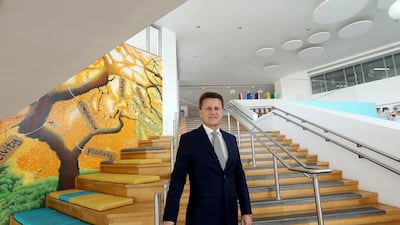Some schools in Dubai are ditching homework to allow pupils to "have a life" and ease the demands placed on parents.
Three school operators in the emirate, Arcadia Education, Taaleem and Ambassador Education, told The National they have either stopped the age-old practice or limited the amount of work children are asked to do at home at a number of their schools.
Instead of completing work at home, often with the help of parents, schools have allocated time within class hours for studies to be finished under the supervision of teachers.
The education trend in Dubai follows a global movement spearheaded by countries such as Finland that have worked to limit the number of hours pupils spend on homework.
In 2018, Bahrain followed suit when the country's Ministry of Education announced a ban on homework.
At Ambassador International Academy in Dubai, children do "homework" within school hours and are given time twice a week to ensure tasks are completed.
"Children should have a life and across all grades should do homework at the school not at home," said Kamal Kalwani, chief executive of Ambassador Education in Dubai, a private school operator.
"Parents also end up spending a fortune on tutoring their children after school while that extra help is provided to children at the school here.
“Parents also struggle with homework taking children from one side of town to another for tutoring lessons, which is another bane."
Graham Beale, executive principal at Arcadia School in Dubai, said levels of homework are a common source of frustration among parents.
“We asked parents what are the things they find frustrating when designing our curriculum and one of the things they mentioned was homework," he said.
The school has classes until 4pm and has built in time for homework and enrichment in terms of coaching and training.
Children are provided with two to three hours time every week to complete work, which otherwise would be done at home.

"This is more targeted and pertinent than just sending some work home as the homework is done with the teacher," said Mr Beale.
"We felt that children were tired when they got home and parents were saying to us they found homework stressful. We also thought if we could deal with those issues at school and helped with learning and work at school, that could allow for more family time for parents.
"When parents come home, they can focus on interesting family bonding opportunities.
"We often get feedback from parents that they appreciate the difference it makes for them at home.
"Some schools think the more homework you give, the better job you are doing. We are the opposite of that," he said.
Amy Falhi, acting head of primary at Dubai British School Jumeirah Park, is keen to find ways to lighten the workload of pupils while ensuring they do not lose out on vital studies.
"We have spent time over the last half term reviewing our home learning procedures, taking in pupil and parental feedback, reaching out to other schools and researching the impact that home learning has on children and have taken action to significantly reduce the burden that home learning can sometimes place on our students and their families," said Ms Falhi.
"We researched schools in Dubai and UK and found that many have cut back, with some schools not sending homework at all. We wanted a middle ground for our parents and feel the home practice is the way to achieve this."
The school supports families with their views on homework, and if a child does not finish their home practice at home and the parents want the school's support, they help children with this.
"There is some value in homework but there are many variables such as how much support a pupil has had, parents unsure of methods teaching 'their way' and potentially confusing children and the impact on family life."
Their revised home learning policy ensures it is built on purposeful study and does not take too much of the child's time; is flexible and can be adapted to the pupil's schedule; does not require a lot of adult supervision; and is also engaging and fun.
Parents of children in years one and two are encouraged to read, write, practice numbers and reasoning with their children.


